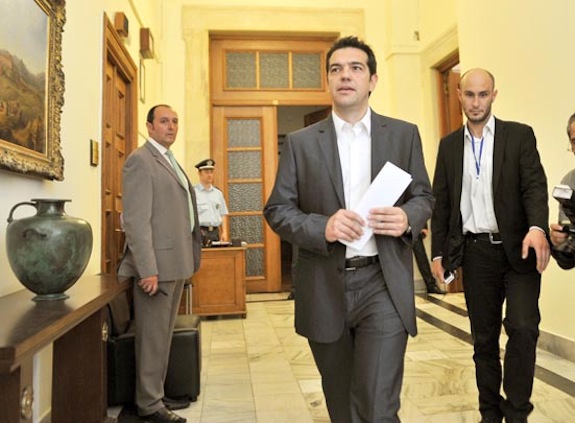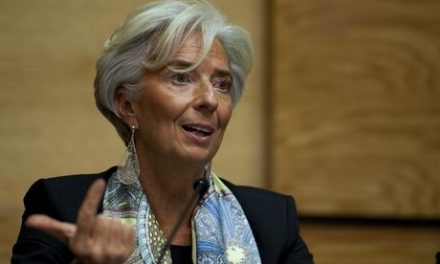By Catherine Boyle, CNBC
The first financial tests of Syriza’s audacious new policies for Greece loom – as it is still unclear who will concede ground on its debt pile first.
Alexis Tsipras, the new Greek Prime Minister, may end up banging his head off a wall of opposition from Germany, the biggest single contributor to Greece’s bailout, who is staunchly against any debt relief for the struggling country.
On Friday, Reuters cited a source saying that Greece planned to refuse to allow a planned visit from its bailout supervisors in the European Union and the International Monetary Fund. The country’s finance minister announced during the day that Greece would not be seeking to extend its bailout program.
The biggest bones of contention will be whether Greece can secure a nominal debt haircut, or even some further aid, and the halting of its privatization program, imposed by the troika of international bodies which oversee its bailout, agreed upon a few years ago.
The halting of the privatization program was seen as an early signal of intent by Tsipras, and caused shares of Greek banks to plummet this week.
On Friday, the country’s new energy minister, Panagiotis Lafazanis, told Reuters that the government would cancel plans to sell a state-owned natural gas utility. This came after the sale of the lucrative Port of Piraeus, as well as shares in Greece’s biggest refinery, Hellenic Petroleum, were scrapped.
“These announcements (on privatization) will satisfy the unions but scare away new investors,” Miranda Xafa, CIGI senior scholar and chief executive of E.F. Consulting, warned CNBC.
If a deal is not reached soon, the consequences for ordinary Greeks could be severe. Giorgos Romanias, an economist from Syriza’s right-wing coalition partner Independent Greeks, who is Greece’s new secretary for social security, said on television Thursday that pension payments could be “a little tight” in March.
Demographics are not in Greece’s favor. As a result of the country’s poor economic situation, pensioners have often supported unemployed children and grandchildren, as well as themselves – so any threats to their payments will have a wide-ranging impact. More Greeks were either unemployed or drawing a pension than in employment in 2012 and 2013, according to government statistics. And as the crisis has deepened, the birth rate has fallen, meaning that there will be even fewer young tax-paying workers to support an aging population over the next few decades.
The cash flow of Greek pension funds fell from 2.155 billion euros in November 2013 to just 435 million in November 2014, according to figures from the Greek government, flagged by ekathimerini.com, the English language website of prominent Athens newspaper I Kathimerini.
Many in the stock market are hoping that Tsipras’s tough talk en route to power will be curtailed by reality and pragmatism.
A typical view comes from analysts at Rabobank, who argue in a research note: “Any political capital the Syriza-led government would hope to gain by taking a hard line would be more than wiped out were this stance to result in a Greek exit. This we believe, will be very much in the minds of all at the table in Athens today, no matter how pressured the new government feels to maintain the tough anti-austerity talk that saw them so convincingly swept into power.”
Yet there is a growing sense of unease, which is not being helped by statements from various leftist divisions of Syriza.
The government’s actions in its early days of power, such as scrapping fees for prescriptions and rehiring workers, may play well to their supporters, but will increase the financial burden on the Greek state.
After suggestions earlier in the week that the new Greek government may not back the EU’s stance on sanctions against Russia over its actions in Ukraine, Russian Finance Minister Anton Siluanov told CNBC Thursday that Russia would consider giving financial help to Greece.
Never mind that Russia is likely to need its substantial cushion of foreign currency reserves as a bulwark against sanctions, the falling ruble and oil price; the comments still heightened fears of increasingly prominent Russian influence in the Baltics.
Tsipras barely had time to celebrate his victory before being whisked off on a whirlwind tour of European leaders who have shown varying levels of support for his anti-austerity stance.
Friday’s meeting with Eurogroup President Jeroen Dijsselbloem, who was quick to remind the new Greek leadership that members have to “abide by the rules and commitments” they made, could be tense.
On Monday, new Finance Minister Yanis Varoufakis will meet both his U.K. and French equivalents, who are likely to be more sympathetic to Syriza’s arguments. Tsipras will also appear in Brussels at some point next week, according to an European Union spokesman. Then on February 11, Angel Gurria, OECD Secretary General, is due in Athens.
The past four years do not seem to have worked in breaking the hold of a few Greek oligarchs on the country’s economy, and living conditions have worsened.
The one thing that is clear from the election result is that ordinary Greeks want some kind of change to their status quo. If he can’t deliver that change soon, Tsipras may find himself campaigning in another election before too long.



















